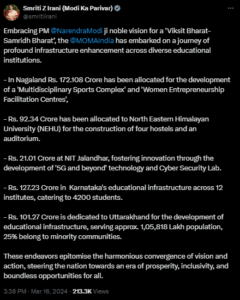In the annals of India’s post-independence history, a singular narrative thread has been conspicuously absent: a national ambition akin to Viksit Bharat by 2047. This absence was poignantly underscored by Smriti Irani, the union minister for women and child development and minority affairs, during her address on Tuesday at News18’s Rising Bharat Summit on March 19 in New Delhi.
Irani’s remarks served as a sobering reminder of India’s journey since gaining independence from British rule, and the long-standing absence of a unifying national goal that transcends regional and ideological divides.
Irani’s assertion echoed the sentiments of many who have long lamented the lack of a cohesive vision for India’s future beyond the immediate challenges of governance and economic development.
In her view, the dearth of a national ambition akin to Viksit Bharat by 2047 harks back to a bygone era when India’s struggle for freedom galvanized the nation towards a common purpose. It is a sentiment rooted in the collective memory of a generation that bore witness to the sacrifices made during the independence movement, and the fervent belief in a brighter, more prosperous future for the nation.
Irani’s leadership beyond emotional appeals
 However, Irani’s reflections went beyond mere nostalgia, as she sought to draw parallels between the leadership styles of past and present. In her view, only a select few leaders, such as Atal Bihari Vajpayee and Narendra Modi, have eschewed the traditional playbook of emotional appeals in favor of a more pragmatic approach centered on performance and governance.
However, Irani’s reflections went beyond mere nostalgia, as she sought to draw parallels between the leadership styles of past and present. In her view, only a select few leaders, such as Atal Bihari Vajpayee and Narendra Modi, have eschewed the traditional playbook of emotional appeals in favor of a more pragmatic approach centered on performance and governance.
These leaders, according to Irani, represent a departure from the politics of populism and rhetoric, instead advocating for a more substantive engagement with voters based on achievements and results.
Prime Minister Narendra Modi, in particular, emerged as a central figure in Irani’s narrative, hailed as the torchbearer of a new era of national ambition and development. Irani lauded Modi for articulating a vision for India’s future that transcends partisan politics and narrow interests, embodying the spirit of Viksit Bharat by 2047.
Modi’s vision for National Development
Modi’s vision, according to Irani, represents a clarion call to action for all Indians, regardless of their background or political affiliation, to work towards a common goal of national progress and prosperity.
Irani’s remarks come at a pivotal moment in India’s political landscape, with the impending Lok Sabha elections looming large on the horizon. As the country gears up for one of the largest democratic exercises in the world, the question of India’s national ambition takes on added significance.
 Irani’s impassioned defense of Modi’s leadership and his vision for the country underscores the high stakes involved in the upcoming elections, as voters grapple with competing visions of India’s future.
Irani’s impassioned defense of Modi’s leadership and his vision for the country underscores the high stakes involved in the upcoming elections, as voters grapple with competing visions of India’s future.
However, Irani’s address was not without its critics, as she faced questions about the state of India’s democracy and allegations of electoral autocracy. In response, Irani vehemently defended India’s democratic credentials, arguing that such claims were unfounded and disrespectful to the country’s 940 million voters.
She cautioned against the tendency to undermine the agency of Indian voters, asserting that the wisdom of the electorate should not be underestimated or dismissed.
Defending India’s democratic processes
In the crucible of India’s democratic process, where ideas clash and visions vie for supremacy, Smriti Irani’s call for a national ambition akin to Viksit Bharat by 2047 reverberates as a clarion call to action.
As the nation stands on the cusp of another pivotal moment in its history with the upcoming Lok Sabha elections, the urgency of defining a collective vision for India’s future has never been more apparent.
Irani’s impassioned defense of leaders like Narendra Modi, who champion a politics of performance and development over rhetoric and emotion, underscores the need for a paradigm shift in India’s political discourse.
Yet, amidst the fervor of electoral politics and the cacophony of competing narratives, it is imperative to remember that the destiny of the nation ultimately rests in the hands of its people. India’s democratic ethos, forged through decades of struggle and sacrifice, demands that the voices of its citizens be heard and respected.
 As voters prepare to cast their ballots and shape the course of the nation, they must do so with a clear-eyed understanding of the challenges and opportunities that lie ahead.
As voters prepare to cast their ballots and shape the course of the nation, they must do so with a clear-eyed understanding of the challenges and opportunities that lie ahead.
In the final analysis, the quest for a national ambition is not merely a political slogan or a rhetorical flourish; it is a solemn obligation to future generations who will inherit the legacy of our decisions. Whether India fulfills its potential and realizes its aspirations depends not just on the actions of its leaders, but on the collective will and determination of its people.
As the journey towards Viksit Bharat by 2047 unfolds, let us heed Irani’s call to transcend the narrow confines of partisan politics and unite in pursuit of a shared vision for a stronger, more prosperous India.
ALSO READ: Morgan Stanley states India can’t replicate China’s 8-10% growth










